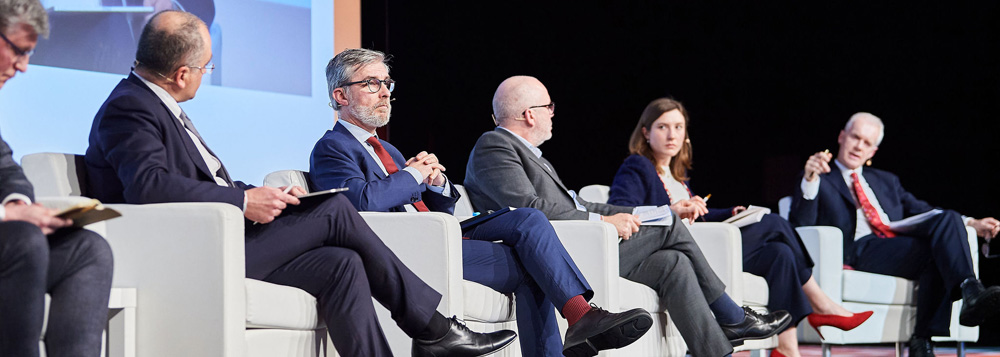2024 Annual Conference summary – Session 4 and closing
How to fund the transition?
Monday, Apr 08, 2024
Mary Whittow, Principal Consultant of Sustainable Agri-Food, Anthesis Group, opened the discussion by saying the cost for the first year of an EU-wide transition based on improved soil health would be around €28-35 billion. Soil was the basis for the calculation since its health is measurable. The figure is large, “but the cost of inaction is far greater” – some €50 billion annually. The cost must be covered by a blend of different public and private options, bringing together private funding and industry and potentially involving consumers. “It should not be down to farmers. This should be clear.”
Chris Hogg, Global Head of Public Affairs, Nestlé, supported the need for shared responsibility, pointing out there are 300,000 food companies in Europe. To scale up existing investment, policy makers must deliver a stable environment “to install a sense of confidence”. Mainstream investors are increasingly focusing on sustainability “because they see the risks climate change will bring”.
He saw little evidence of the public willing to pay more for sustainable food. Consumers “will buy your product if they value that product”, because of quality, taste, nutrition or sustainability. Later, a speaker from the floor wondered legislation was needed to make harmful food more expensive and healthy items cheaper.
Boris Erg, Director, European Regional Office, IUCN, agreed financing the transition required “all hands on deck”. The IUCN is already working on nature based solutions to direct budgets to sectors relying on nature. It estimates the nature finance gap is “around 700 billion a year”. Repurposing harmful subsidies would go some way to reaching the figure.
He identified “a big shift” in understanding of the issues involved. The “Whether” is being replaced by the “How”. He raised the idea of building wider appreciation of the different ingredients incorporated in a productʾs final price. That could increase the value of labour.
Alessandro Cataldo, Partner, Europe Agrifood sector leader, EY, explained the major accountancy consultancy group aims to positively impact a billion lives by 2030. Agriculture and food give the necessary levers where action can impact on climate, food security and farmers’ incomes.
Finance for farmers is crucial to support practices underpinning regenerative culture. They will face yield loss when moving from conventional farming, premium prices for products are difficult in current food systems and soil takes relatively long to stabilise. He suggested carbon sinks could “free up a value that can be monetised through the value chain” as a source of income.
Martin Reesink, Advisor to the Board on Food & Agri EU matters, Rabobank Global Food & Energy Networks, listed the enablers the bank uses to invest to restore nature and act on climate: developing knowledge and financial solutions, promoting innovation and working in partnerships. The bank has created a Biodiversity Monitor science base which, to the benefit of both farmers and financial institutions, provides data on a farm’s sustainability. Policy makers need “to incentivise the entrepreneurship of farmers”, rather than be prescriptive, encouraging them to build farming models that produce better outcomes.
Closing session
Janez Potočnik drew some early conclusions from the day’s discussions: fear, rather than positivism, tends to change human behaviour; governments only act when everything else is exhausted; finance is not lacking; and system change is possible as working from home during Covid demonstrated.
Admitting it was “hard to be science based and optimistic at the same time”, he has hopes in the younger generation with their long-term perspective. He called for a member for future generations within governments and the Commission to represent the important, not the urgent. Tax should be used to give “signals to producers and consumers where we should go” and tax havens abolished. He recalled how the Commission produced change by combining climate and energy policies, forcing experts in each to understand the views of the other. He suggested the same approach for the environment and agriculture. He strongly defended the European Green Deal as “a visionary document” guaranteeing the necessary parallel social and environmental transition.
Janez announced a new advisory group of Tassos Haniotis, Geneviève Pons and Ann Tutwiler to help the Forum deliver its mission and commitments. He welcomed new members Login5 Foundation and Renature and thanked the founding and strategic partners and all those involved in the conference.
Further information on the speakers plus videos of this session can be viewed on the event page.



